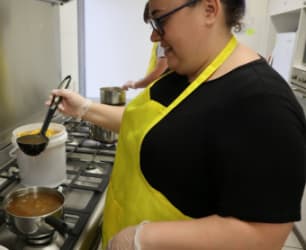THE block of land nestled on Loxton’s outskirts may be unassuming, but exciting things are happening for the husband-and-wife team at Black Sheep Produce, home to three unique crops.
Following a record harvest of jujubes and capers earlier this year, Dave and Heidi Setchell are again looking at the upcoming harvest to be bigger and better, with hopes their date palms flower this spring.
The Loxton farm currently has one-third of a hectare of capers – working out to around 200 plants – and three hectares of jujubes, plus one and a half hectares of date palms.
While the pair have been in the produce game for nearly 20 years, they developed their Black Sheep business over the past couple of years after moving crops to the Riverland from the Mallee.
“We had a farm in the Mallee, and we were playing around with all these crops but not in a serious way,” Dave said.
It’s only when we decided to downsize to this block – closer to home – and transplant everything here that we said, ‘Yep, this is what we’re doing; we’re growing these three things and we’re going to call ourselves Black Sheep Produce’.”
The unique choice of crops came from the simple need to grow what the salty groundwater at their original Mallee farm would allow.
“We were also pretty motivated by wanting to grow things that were suited to the local environment and weren’t high-input,” Dave said.
“We were originally wanting to get into growing natives, like wattleseed and quondongs, but we did a lot of research into it and there hadn’t been a lot of marketing. Everyone who was growing native produce at the time were producing crops but then finding they had no one to sell it to.
“We planted the dates first (in the Mallee) but they take a long time to come into production. So we planted the capers – but they’re a lot of manual work and very expensive to pick because of how time-consuming it is – and then went to jujubes.

“Jujubes are the thing we’re going with at the moment because although they’re quite labour intensive, they come into production quite quickly. You get a good price for the fruit and you’re not on your hands and knees like you are with the capers.”
The Loxton farm currently has about 2000 jujube, caper and date plantings, however due to many of the crops being young, or transplanted from the Mallee, the business is yet to reach full production.
“We’re hoping that we’ll eventually get up to around the 10 tonne per hectare, and we’re about mid-way now,” Heidi said.
“Most of the plantings are fairly immature, so we’re hoping to hit full production by 2025.
“Because we’re keeping our trees a bit more compact, we’re erring on the conservative side with the yield projections, but they just keep amazing us year after year with their production.
We got absolutely hammered last October by the hailstorm that hit here and we were thinking we’d have quite a reduced crop – but it didn’t work out that way. They still pumped out a lot of fruit for individual trees.
“The greatest impact was the damage of the branches that created a weakness – so once they became fruit bearing, we had a few limbs snap off the tree.
“Once it hits full production it will be very interesting to see what sort of crop we can yield.”
In another unique practice, Dave and Heidi hand-pollinate the date palm flowers and, following less than ideal weather conditions earlier this year, began collecting pollen from the male flowers this winter.


“It’s been a weird season with the dates… normally we would get a flush of flowering in autumn, and we would pollinate those flowers for harvest in summer,” Dave explained.
“Because summer was fairly cool and so was autumn, everything is flowering now, but you can’t pollinate when the weather is too cool because you don’t get the fruit set.
“Some varieties can be sensitive to temperature, and we have about seven or eight varieties of date palm here.”
While the Black Sheep Produce business currently sells dried jujubes in various states, plus caper berries and buds, Dave and Heidi have a keen outlook on potential future products for the business.
“We’re certainly not short on ideas,” Heidi laughed.
We’ve been playing around with a jujube drink – a healthy, non-alcoholic option – and we’re thinking of caper relishes and packaging the leaves.
“We’ve never gone into the caper leaves, but we’re looking at getting some of those packaged and that will just round off the capers… in that you can use three aspects of the plant.”
Due to having low-input crops and a reduced scale production of fruit, Black Sheep Produce has been unaffected by the recent hike in fertiliser costs.
“We try and use natural products like Neutrog and worm castings,” Heidi said.
“They’re probably more expensive products but because we’re doing it over a smaller scale it’s not killer to our bottom line, compared to someone with 40 hectares of vines.”
The next harvest for Black Sheep Produce will begin in November, with the caper plants expected to put out new growth as the weather warms up during spring.






